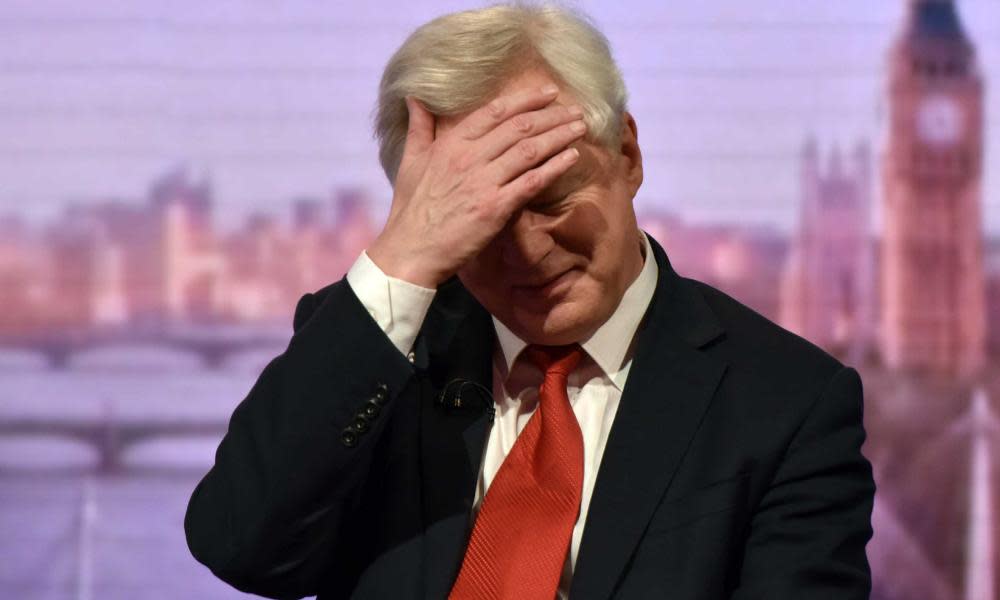Just seven words are keeping a Brexit deal afloat for all sides | Gaby Hinsliff

Nothing is agreed until everything is agreed. If those seven words don’t already inspire a powerful urge to throw something at the wall, then don’t worry, they will soon enough.
This phrase is fast emerging as the new “Brexit means Brexit”, a kind of gnomic verbal chaff thrown up whenever the prime minister needs to sound tremendously definitive while revealing absolutely nothing. But like its predecessor, its very meaninglessness does actually tell us something, if only that there’s trouble ahead.
Today Theresa May came to parliament to explain what just happened in the Brexit talks, which was practically an afternoon’s work in itself. Just to recap, for anyone who has lost the will to live by now: first her deal was unravelled at the 11th hour by the Democratic Unionist party, in a painful reminder that she only clings to power at the discretion of her coalition partners. Then it was heroically re-ravelled in time to be signed on Friday, to genuine gulps of relief on all sides.
And then it was frayed at the edges on Sunday by David Davis suggesting on the BBC’s Andrew Marr Show that the deal wasn’t binding and therefore perhaps not all that meaningful. Who knows what its state of ravelledness will be by the time you read this, but if nothing else the past few days have taught us something about the hellish political conditions under which May is trying to operate.
The great mystery at the end of last week was how on earth she had convinced Tory Brexiters to embrace a deal they could easily have hated, given how tantalisingly close it brings us to a soft Brexit (or more specifically, a deal where Britain would remain closely aligned with EU regulations in many areas if alternative solutions to the Irish border problem turn out to be as unworkable as they sound). One answer is that they just don’t think the deal is all that meaningful. Much now hinges on whether they are right.
In a strict legal sense, of course, they are. That’s what “nothing is agreed until everything is agreed” means. It means both sides can say what they like about the broad outlines of the final deal now, but if the next phase of talks hit the rocks – if it’s clear there won’t actually be a final deal – then all of this is effectively null and void.
Hard Brexiters still have plenty of chances to pull the plug on this whole process, or on May, if they start to get worried about where she’s going – and the knowledge that they can do so is almost certainly necessary to keep them onboard. When Ken Clarke asked the prime minister in the Commons to confirm that “nothing is agreed until everything is agreed” doesn’t actually mean everything can be torn up on a whim, May tried her level best to confirm as little as possible.
But the fact that Davis was sent out to clarify his Sunday morning remarks suggests Downing Street desperately doesn’t want to be seen as negotiating in bad faith. May will understand the serious risks to the Irish peace process of undermining the assurances given, and she knows business is desperate for more certainty on which to plan ahead. As Jeremy Corbyn told the Commons – with quite some chutzpah, given Labour’s own Brexit strategy seems practically to evolve by the hour – it may well be time for some clarity.
The problem is that clarity is the one thing May dare not provide, because the minute anything is illuminated then it’s a target for someone. Her best hope is generating a sort of permanently confused twilight in which nobody (including her own cabinet, which still hadn’t formally agreed the precise form Brexit should take even as the EU agreed we had made significant progress towards it) is entirely sure what’s going on, and therefore can’t be certain yet that they hate it.
So nothing is agreed until everyone finds out exactly what it is that they’re supposed to be agreeing, at which point it is still perfectly possible that nobody will agree to any of it. But the aim is to push the inevitable moment of truth – the point where both leavers and remainers realise exactly what’s going to happen, and someone goes ballistic – as far down the road as possible.
This is of course the sort of deliberate obfuscation that gives politics a bad name; by turns maddening and baffling, and permanently teetering on the edge of rank dishonesty. But just occasionally, it is also the only thing that makes politics work at all. Labour knows that perfectly well, which is why it has its own version of constructive ambiguity designed to keep both leavers and remainers on board the Corbyn project.
May’s strategy, meanwhile, is starting to feel uncannily like a clumsier version of what happened in the run-up to the Good Friday agreement, when key phrases – putting paramilitary weapons “beyond use”, say – were left just hazy enough to get both sides to agree.
The point then was to keep the momentum going, keep all sides talking. And, as now, to hope against hope that by the time negotiations reached the crunch point everyone would have simply gone too far down the road to turn back.
• Gaby Hinsliff is a Guardian columnist

 Yahoo News
Yahoo News 
